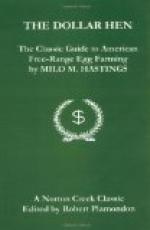Incubators on the Farm.
My candid advice to the farmer who is in doubt as whether to buy an incubator or not, is to let it alone. If the farmer reads the chapter on artificial incubation, he will see that he is dealing with a very complex problem, and one in which his chances of success are not very great.
In order to learn the facts concerning incubators on the farms the writer made a special investigation on the subject while poultryman at the Kansas Experiment Station. Replies received from 111 Kansas farmers, report 21 as having tried incubators. Of these, 6 reported the incubators as being an improvement over hatching with hens; 10 reported the incubator as being successful, but not better than hens, while the remaining 5 declared the incubator to be a failure. The results of this inquiry, and of personal visits to farms, led the writer to believe that about one-tenth of the farmers of Kansas had tried incubators, and that about as many failed as succeeded with artificial hatching.
The argument for the incubator on the farm is certainly not one of better hatching, but there is an argument, and a good one for the farm incubator. The argument is this: Hens will not set early enough and in sufficient quantities to get out as large a number of chicks as the farmer may desire. Now, each hen will not hatch over 10 chicks, but is capable of caring for at least 30. Here the incubator comes into good use, for the farmer can set a half dozen hens along with the incubator, and give all the chicks to the hens. This is the method I recommend where an incubator is to be used. The development of the public hatchery would supply these other 20 chicks more economically and more certainly than the farm incubator, but until that institution becomes established the more ambitious farm poultry raisers are justified in trying an incubator.
The best known incubators in the market are the Cyphers, the Model and the Prairie State. Cheaper machines are liable to do poor work. The following points may help the farmer in deciding whether or not to buy an incubator and in picking out a good machine.
The person to run the incubator is the first condition of its success. A good incubator requires attention twice a day. One person should give this attention, and must give it regularly and carefully. The farmer’s wife or some younger member of the family can often give more time and interest to this work than can the farmer. The likelihood of a person’s success with artificial hatchers can best be determined by himself.
The best location for an incubator is a moderately damp cellar. The next choice would be a room in the house away from the fire or from windows. Drafts of air blowing on the machine are especially to be avoided. Not only do they affect the temperature directly, but cause the lamp to burn irregularly, and this may result in fire.
The objects in view in building an incubator are: (1) To keep the eggs at a proper temperature (103 degrees on a level with the top of the eggs). (2) To cause the evaporation of moisture from the eggs at a normal rate. (3) To prevent the eggs from resting too long in one position.




